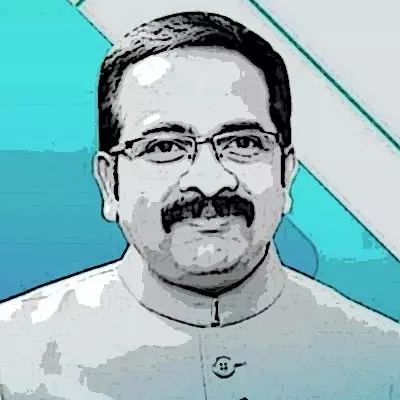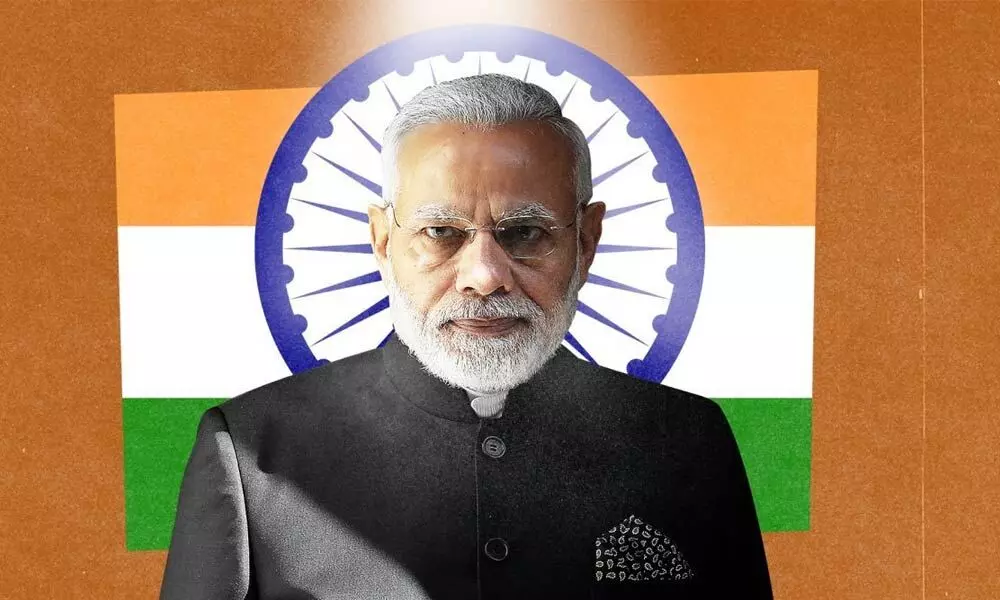Live
- All you need to know about PAN 2.0
- Akasa Air redefines travel experience with industry-first offerings
- MP: Residents stage protests against liquor shop in Indore
- Telugu Actor Shri Tej Booked for Alleged Cheating and False Promise of Marriage in Live-in Relationship
- Toyota Kirloskar Motor Celebrates 1 Lakh Urban Cruiser Hyryder on Indian Road
- MLS: New York City FC part ways with head coach Nick Cushing
- Delhi CM says Centre cutting AAP voters’ names from rolls, BJP hits back
- Hyderabad Metro Rail Phase-II Works to Begin in Old City in January 2025
- Odisha: 668 persons killed in human-elephant conflicts in last three years
- DEFENDER JOURNEYS: TO EMBARK ON ITS THIRD EDITION FROM NOVEMBER 2024
Just In
PM Narendra Modi: A reliable crisis-leader


PM Narendra Modi: A reliable crisis-leader
In his social and political career spanning over 40 years, PM Narendra Modi has proven multiple times that he is a reliable ‘crisis-leader’
In his social and political career spanning over 40 years, PM Narendra Modi has proven multiple times that he is a reliable 'crisis-leader'. His unmatched ability to look into the eye of a storm, uncompromising courage to stand up against consistent attacks, uncanny intelligence to manage uncertainty and fluid situations have been at display since long. It is not just these characteristics of managing a crisis, but his ability to respond and resolve is what makes him a reliable crisis-leader.
There is a dimension in PM Narendra Modi's natural leadership model that manages any magnitude of crisis. His personal life, political journey and performance record as a leader of governments - both at the state level as the Chief Minister of Gujarat since 2001, and as the Prime Minister of India since 2014, are checkered with massive obstacles, spiteful distractions and monstrous challenges.
PM Modi has neither ducked nor failed at managing any adversity so far. His ability to stay focused on 'solution' when the 'problem' is overwhelming, and his competence to bring massive resources to play using multi-pronged strategies, is what gives him positive results every time. This unique temperament and personal disposition of not getting shaken or stirred during the worst of a crisis, is what makes him a very reliable crisis-leader.
What is a crisis?
Crisis is an unplanned adversity. Every crisis poses a serious challenge to all involved, but it poses bigger challenge to the leader. 'Crisis-Leadership' is all about how a leader responds and overcomes an adversity of massive proportion.
Crisis-leadership in any domain, whether it's social, organisational, political or governmental, is characterised by the quality of response, initiatives, approach, inspiration and delivery. Leaders can be graded, rated and respected based on five primary criteria, while there are many other measures to rate overall leadership competence.
There's an immense possibility that non-performers can rise to leadership roles, without having to be measured on these criteria. Especially when family succession, luck or timing favours them. If they don't encounter major crisis in their journey, they tend to pass through their leadership roles with routine management, where crisis-leadership doesn't come to play.
However, one big crisis is enough to expose and differentiate an inherited-leader from a crisis-leader. Almost all first generation, hard-working, experiential leaders are mostly crisis-leaders, as they build everything from scratch. Nothing is handed over to them on a platter.
PM Narendra Modi will pass with flying colors, when routed through this leadership test. His entire political career is a 'crisis-test' of sorts. PM Modi has delivered success every time he was challenged by a crisis.
A crisis challenges the core values and beliefs of a leader as it brings along massive uncertainty, instability and fear of the unknown, by destroying the status-quo.
Re-visioning in crisis
A leader is defined by his vision. A leader has a vision, if he can set a larger purpose and visibly see a point of its fulfilment in a clearly defined future timeline.
However, just having vision isn't enough. A leader must effectively communicate his vision, to draw all those who wish to be led there. PM Narendra Modi has been doing this since 2001, no wonder he has won all elections that he fought so far.
Crisis is a huge obstacle for a leader who is on a path to fulfill his vision. Crisis has a huge pull-back effect and will undo months, years and even decades of progress a leader has made moving towards his goals. How a leader manages to reset his course, re-envision his purpose and lead his people on a new path towards a larger vision, is critical during a crisis.
Leaders know that crisis is a possibility and are prepared to face it. Crisis-Leaders are built to absorb shocks of massive magnitude.
'Re-visioning' is the core competence of a crisis-leader. The precision and speed with which a leader can 'Re-vision' impacts the results he can accomplish during and after a crisis. PM Modi has showcased currently and in the past, that he can absorb massive setbacks and shocks, and can still 'Re-vision' to continue progress.
Disproportionate response
A leader is recognized by the initiatives he takes. Great results are not possible without great initiatives. The size, frequency and degree of an initiative defines the greatness of a leader. During a crisis, these initiatives are considered as 'response to a crisis'.
PM Modi has a signature style response mechanism as a 'Crisis-Leader'. Once he senses a crisis, he unleashes disproportionate response. For example, when unprecedented spike in medical oxygen demand turned into a crisis during the second wave of Covid-19, he has unleashed disproportionate response to manage and overcome the crisis.
The government under his leadership, has attacked the issue from multiple quarters with massive resources and ensured that the crisis is managed in just few days. Knowing how he operates during crisis; I can assure that medical oxygen will never be in short-supply ever in India.
PM Modi's disproportionate response to a crisis, is so massive that medical oxygen production would be surplus in India, and can even be exported at a later date. This is how he approaches any crisis as a reliable 'Crisis-Leader'. As I follow and analyse his long political journey, I see many such examples at every milestone he has travelled and his response has been quite similar every time.
Consistent inspiration
To inspire is to lead. To inspire in great times is easy. Crisis-leadership is about inspiring in tough times, in dire situations and during uncertain times. PM Narendra Modi understands the nuance of consistent inspiration during a crisis.
PM Modi goes on a communication overdrive during a crisis. In a position of power he is at, it is easy to get drawn into heavy-lift routine of planning, reviewing and fire-fighting during a crisis. However, he does quite the opposite.
He makes time and relentlessly engages with all the stake holders through constant communication and inspiration. He doesn't drift into the regular and mundane administrative functions, as he consciously recognises the core function of a crisis-leader is 'Consistent Inspiration' – especially during a crisis.
Crisis has the power to demoralise and derail personal, institutional and national pursuits. Depending on the degree and size of a crisis, it can negatively impact self-confidence, motivation and spirit of purpose. Crisis can directly and indirectly impact the productivity, performance levels of individuals and institutions negatively. It has been proven historically, that prolonged periods of crisis have the power to increase anxiety, stir up hopelessness, instill self-defeating thoughts and even lead to depression-led suicides or desperation-led crime.
PM Modi understands that it is his responsibility to inspire and pull people out of distress, hopelessness, lack of confidence and give them new spirit and purpose. Through his decisions, actions, speeches and initiatives, he wades through the muck of negativity to reach out and lead people into light and hope.
Crisis - an opportunity
A prolonged crisis can undermine initiatives, action and there by results. However, a Crisis-leader can explore ways and means to turn a crisis into an opportunity to take brand-new initiatives and plan new outcomes.
PM Narendra Modi doesn't allow a crisis to cripple his urge to implement the governance agenda. He will simply find new methods to approach the execution of his agenda differently, sometimes even more efficiently during a crisis. For example, his initiatives of expanding health infrastructure, unifying India through spirit of nationalism, health diplomacy, reforms in manufacturing sector, reforms in agriculture sector, defense preparedness, social-media reforms and many others, are indicators of using crisis as an opportunity to advance the governance agenda in the national interest.
A crisis-leader looks for a silver-lining in a dark cloud. His positive-orientation, emotional intelligence, stable composure allows him to stay positive, alert and convert all adversity into opportunity. The quality of initiatives taken during a crisis by a leader, establishes how a leader can continue to operate efficiently under massive duress and uncertainty.
Method and delivery
Great leaders historically have adopted methods which are untested by their predecessors. They have turned those methods successfully into globally acceptable models - to achieve great results.
Crisis gives great opportunities to leaders to experiment with new methods and approach the problems from unconventional and different angles. At times, leaders are left with no option but to try new methods, as they are cornered and pushed to act. However, the breed of leaders we are discussing here, proactively use crisis to bring-in new methods, new approaches and new instruments to test.
PM Modi has already initiated new models of managing crisis since 2014. While the opposition is busy attacking him relentlessly, he simply resolves one issue after the other and keeps moving ahead. His level-headedness and confidence in his pursuits for larger national interest, makes him undefeatable even during crisis.
PM Modi's ardent critics and distractors are having a field day attacking him, as if he has invented the Covid-19 pandemic. They are wishing, imagining and hoping that this crisis will bring him down. There are hundreds of articles, columns and videos being written, produced and circulated to ensure the false muck of 'incompetence', sticks and instills a negative perception.
PM Narendra Modi is quite a hard-nut to crack under pressure. He is not someone who believes that perception outweighs performance. PM Modi has enough reasons to believe with historic experience, that people of India value performance and delivery. He is simply working towards achieving those results with his performance, as the leader of this nation. His actions will increment and reinforce the trust that Indian voters have reposed in him twice already.
PM Modi has no time for image-management or perception-management. He is busy making decisions and taking initiatives to deliver massive results, to tide-off the current crisis.
Crisis-leadership is a hard ball-game. There are no rules, no precedents, no examples and no mentors. Crisis dissolves everything and opens a pandora box of uncertainty, pain, confusion and pressure. Keeping eyes on results in the middle of this mayhem, requires sharp focus, courage to navigate in the storm and competence to set and achieve big goals.
As I see, PM Narendra Modi is a crisis leader who is custom-built to ride the roughest storms. India is fortunate to have someone as courageous, strong-willed and result-oriented as PM Modi, to navigate the nation through this crisis.
The world today requires crisis leaders in every major field, to lead their respective domains to steer us through this global crisis.
(The author is the chief spokesperson of BJP / an organisational strategist)

© 2024 Hyderabad Media House Limited/The Hans India. All rights reserved. Powered by hocalwire.com






